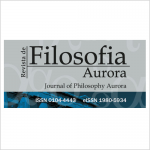INDEXICAL SINN: FREGEANISM VERSUS MILLIANISM
V. 26, N. 39 (2014) • Revista de Filosofia Aurora
Autor: João Branquinho
Resumo:
This paper discusses two notational variance views with respect to indexical singular reference and content: the view that certain forms of Millianism are at bottom notational variants of a Fregean theory of reference, the Fregean Notational Variance Claim; and the view that certain forms of Fregeanism are at bottom notational variants of a direct reference theory, the Millian Notational Variance Claim. While the former claim rests on the supposition that a direct reference theory could be easily turned into a particular version of a neo-Fregean one by showing that it is bound to acknowledge certain senselike entities, the latter claim is based upon the supposition that a neo-Fregean theory could be easily turned into a particular version of a Millian one by showing that De Re senses are theoretically superfluous and hence eliminable. The question how many accounts of singular reference and content are we confronted with here — Two different (and mutually antagonistic) theories? Or just two versions of what is in essence the same theory? — is surely of importance to anyone interested in the topic. And this question should be answered by means of a careful assessment of the soundness of each of the above claims. Before trying to adjudicate between the two accounts, one would naturally want to know whether or not there are indeed two substantially disparate accounts. Grosso modo, if the Fregean Claim were sound then we would have a single general conception of singular reference to deal with, viz. Fregeanism; likewise, if the Millian Claim were sound we would be facing a single general conception of singular reference, viz. Millianism. My view is that both the Fregean Notational Variance Claim and its Millian counterpart are wrong, though naturally on different grounds. I have argued elsewhere that the Fregean Notational Variance Claim - considered in its application to the semantics of propositional-attitude reports involving proper names — is unsound. I intend tosupplement in this paper such a result by trying to show that the Millian Claim - taken in its application to the semantics of indexical expressions — should also be rated as incorrect. I focus on a certain set of arguments for the Millian Claim, arguments which I take as adequately representing the general outlook of the Millian theorist with respect to neo-Fregeanism about indexicals and which involve issues about the cognitive significance of sentences containing indexical terms.
DOI: http://dx.doi.org/10.7213/aurora.26.039.DS01
Texto Completo: https://periodicos.pucpr.br/index.php/aurora/article/view/451

Revista de Filosofia Aurora
A Revista de Filosofia: Aurora (Qualis A2) é uma publicação quadrimestral do Programa de Pós-Graduação em Filosofia da Pontifícia Universidade Católica do Paraná (PUCPR). Vem divulgando, desde 1988, resultados de pesquisas com o intuito de colaborar com a formação e atuação de filósofos e demais profissionais das áreas afins. A Revista de Filosofia Aurora (Journal of Philosophy Aurora) publica artigos científicos, resenhas e entrevistas adotando o processo de revisão (peer review) entre os membros do Conselho Editorial e da comunidade científica especializada, em sistema duplo de revisão anônima (blind review), ou seja, tanto os nomes dos pareceristas quanto os dos autores permanecerão em sigilo.
O título abreviado da revista é Rev. Filos. Aurora e deve ser utilizado em bibliografias, referências, notas de rodapé e legendas bibliográficas.
